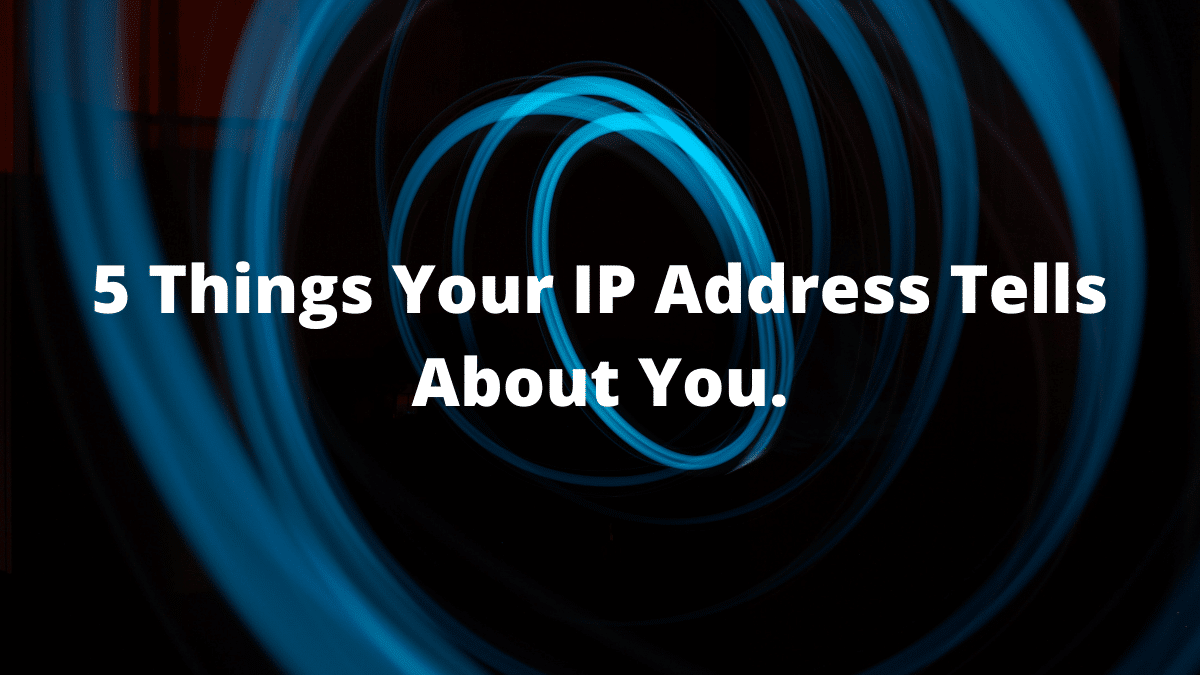5 Things Your IP Address Tells About You

5 Things Your IP Address Tells About You.
The numerous ways in which the Internet has made our life more comfortable is of common knowledge. The entire world is accessible to us in a metaphorical sense. Several commodities that were inaccessible to the majority of the population around the world are now available to a multitude of people, thanks to the advent of the Internet.
Since the expansiveness of the Internet is vast beyond comprehension, regulating its features and limiting the risks to manageable proportions is equally necessary. Several external elements are capable of disrupting our safety and privacy online, and this makes it absolutely imperative to safeguard our online presence, including important websites, emails, passwords, etc.
One primary concept that acts like our fingerprint in the world of the Internet is our IP address. It is important to be aware of the potential of this seemingly simple set of numbers. IP addresses play an extensive role in tracking one’s activities throughout the Internet and are also capable of much more as per routerlogin.app. We need to be well-informed of all the features of this code that is unique for individual users and ensure that it does not pose threats to our privacy in any way.
What Are IP Addresses Comprised Of?
IP is an abbreviation that stands for Internet Protocol. It is a set of numbers that forms a unique code and has four decimals in it. This acts as an identification code, as well as a tool of communication for different devices across the Internet. The locations of all the devices connected across the Internet simultaneously can be detected.
These processes can be attributed to the various ISPs (Internet Service Providers) that we choose for our connection. All of them assign a particular IP address to individual users, which acts as the identifying number for them henceforth.
As a result, tech companies like Google can track all of your records regarding your search history, or basically, any activity of yours on the Internet. Let us learn further about what IP address can learn about us and how it obtains our data in detail. 5 Things Your IP Address Tells About You:
1. Details Of Organisation:
This one might seem fairly simple yet cannot be ignored as less important. When you work using the Internet at your official organization, the details of the organization will also be under record. If someone tracks this information, they can get to know about the whereabouts of your workplace and associated details about it.
2. Geolocation:
This is a piece of key information that most people are aware of. Your IP address has complete details about the geographical location under which you come. Although this is an approximate calculation and the actual physical address is not revealed through this, the city where one lives or the neighboring regions can be tracked pretty easily.
This is also the reason why certain media shows and forms are often blocked in your resident location. Broadcasters might have banned your location from viewing that particular content based on your geolocation details.
3. Internet Service Provider (ISP):
The ISP is the tool that we use to obtain Internet services according to our needs and requirements. This comprises four types that include private, community, commercial, and non-profitable forms of services. If someone gains access to your IP address, they can track down your Internet service provider pretty easily.
This will not turn out to be a major concern until and unless the user participates in illegal activities across the Internet. Under these circumstances, if this is detected, legal authorities have the right to take action on you based on the ISP records.
4. Type Of Service:
There are seven types of Internet services that are currently in use. They include cable connection, fiber connection, DSL connection, dial-up connection, satellite connection, wireless connection, and wireless direct Internet access. The accessibility and the speed levels of your connection can be detected based on this classification of information.
5. Online Activities and Footprint:
This is the most prominent way in which our IP address is capitalized on the maximum. All of our browsing activities are monitored based upon our IP address. We would have often been bewildered at the exact match of our browsing history that reflects on our social media and other feeds. This is wholly based on our IP address’s details.
Although it might seem pretty harmless and solely marketing-related, there are chances that it might fall into the wrong hands and be used. Hence, it is up to us to effectively safeguard our essential data and other sensitive information.
How To Prevent Misuse Of These Details?
The most efficient way to protect our personal information and sensitive data is to take the assistance of a Virtual Private Network (VPN). This service will protect our IP address from getting revealed by assigning us a different IP address of a different location. By this method, we can effectively conceal our actual IP address, thereby refraining from revealing our browsing history, ISPs, geolocation, organizational details, and so on.
Conclusion:
Hence, we have come to the end of the article where we discussed the IP address and their potential capacity in handling our details. There are multiple areas in which IP addresses come into play in our day-to-day lives, and hence we need to be extremely aware of all its consequences and steer clear of all the potential threats.






